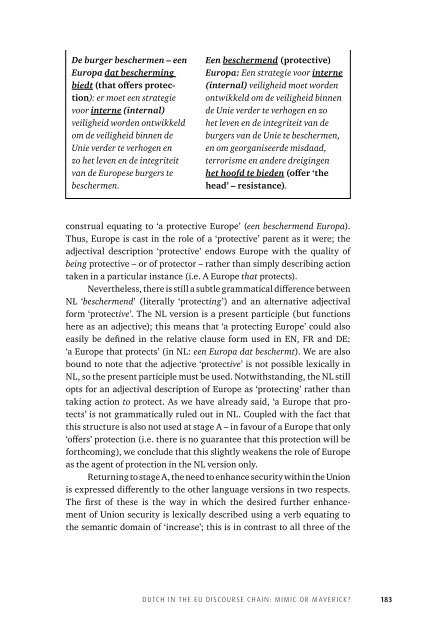Discord Consensus
7aze300jFJo
7aze300jFJo
You also want an ePaper? Increase the reach of your titles
YUMPU automatically turns print PDFs into web optimized ePapers that Google loves.
De burger beschermen –een<br />
Europa dat bescherming<br />
biedt (that offers protection):<br />
er moet een strategie<br />
voor interne (internal)<br />
veiligheid worden ontwikkeld<br />
om de veiligheid binnen de<br />
Unie verder te verhogen en<br />
zo het leven en de integriteit<br />
van de Europese burgers te<br />
beschermen.<br />
Een beschermend (protective)<br />
Europa: Een strategie voor interne<br />
(internal) veiligheid moet worden<br />
ontwikkeld om de veiligheid binnen<br />
de Unie verder te verhogen en zo<br />
het leven en de integriteit van de<br />
burgers van de Unie te beschermen,<br />
en om georganiseerde misdaad,<br />
terrorisme en andere dreigingen<br />
het hoofd te bieden (offer ‘the<br />
head’ – resistance).<br />
construal equating to ‘a protective Europe’ (een beschermend Europa).<br />
Thus, Europe is cast in the role of a ‘protective’ parent as it were; the<br />
adjectival description ‘protective’ endows Europe with the quality of<br />
being protective –or of protector –rather than simply describing action<br />
taken in a particular instance (i.e. A Europe that protects).<br />
Nevertheless, there is still a subtle grammatical difference between<br />
NL ‘beschermend’ (literally ‘protecting’) and an alternative adjectival<br />
form ‘protective’. The NL version is a present participle (but functions<br />
here as an adjective); this means that ‘a protecting Europe’ could also<br />
easily be defined in the relative clause form used in EN, FR and DE:<br />
‘a Europe that protects’ (in NL: een Europa dat beschermt). We are also<br />
bound to note that the adjective ‘protective’ is not possible lexically in<br />
NL, so the present participle must be used. Notwithstanding, the NL still<br />
opts for an adjectival description of Europe as ‘protecting’ rather than<br />
taking action to protect. As we have already said, ‘a Europe that protects’<br />
is not grammatically ruled out in NL. Coupled with the fact that<br />
this structure is also not used at stage A –in favour of a Europe that only<br />
‘offers’ protection (i.e. there is no guarantee that this protection will be<br />
forthcoming), we conclude that this slightly weakens the role of Europe<br />
as the agent of protection in the NL version only.<br />
Returning to stage A, the need to enhance security within the Union<br />
is expressed differently to the other language versions in two respects.<br />
The first of these is the way in which the desired further enhancement<br />
of Union security is lexically described using a verb equating to<br />
the semantic domain of ‘increase’; this is in contrast to all three of the<br />
Dutch in the EU discourse chain: mimic or maverick? 183


